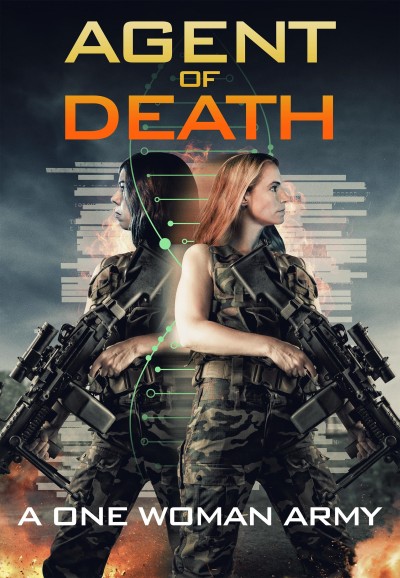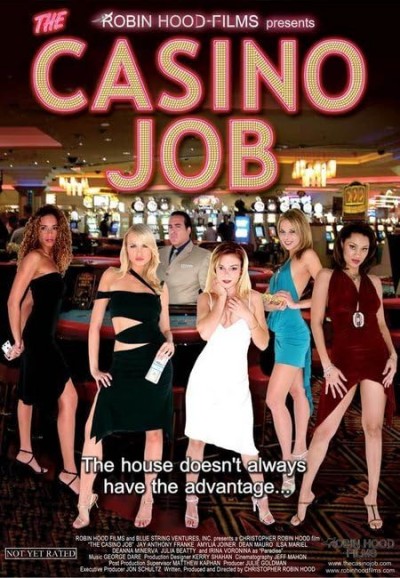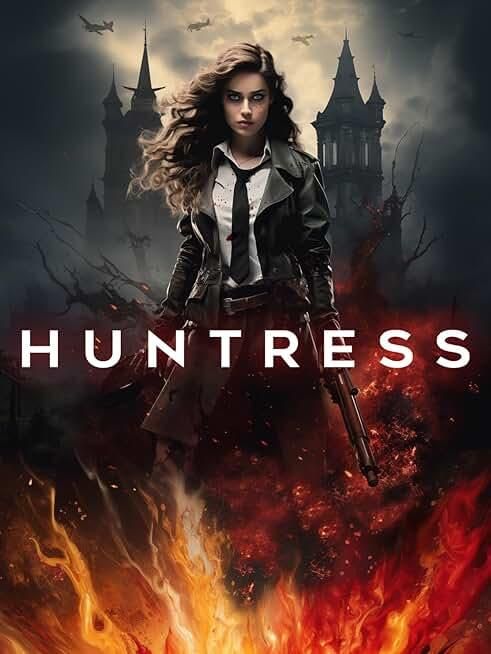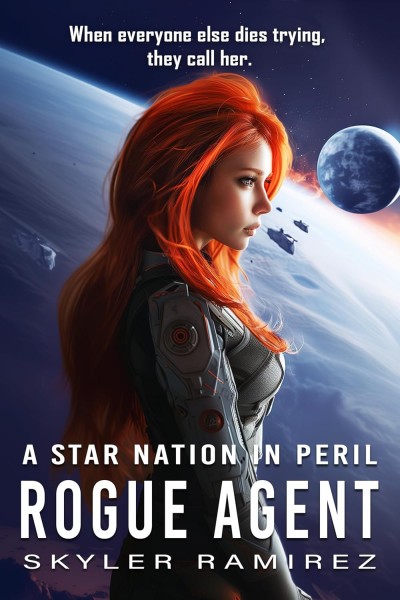★★½
“Multiple personality new world order”
 I quite liked the idea here, but the execution just wasn’t quite good enough to do justice to the concept. It feels like a matter of resources to some degree. But I also feel that a few tweaks to things would have paid significant dividends. The heroine is Tara Croydon (Fox), a CIA agent who experiences a crisis after an operation means she’s not around when her father passes away. In her depression, she signs up for a cutting-edge but rather dubious experimental project under the oversight of Hype (Medina). This involves her being given the ability to transform, physically, into one of fifteen different personas which have been implanted into her.
I quite liked the idea here, but the execution just wasn’t quite good enough to do justice to the concept. It feels like a matter of resources to some degree. But I also feel that a few tweaks to things would have paid significant dividends. The heroine is Tara Croydon (Fox), a CIA agent who experiences a crisis after an operation means she’s not around when her father passes away. In her depression, she signs up for a cutting-edge but rather dubious experimental project under the oversight of Hype (Medina). This involves her being given the ability to transform, physically, into one of fifteen different personas which have been implanted into her.
Once she has come to terms with this, it obviously offers a wealth of possibilities for use on missions. However, this is not entirely without a downside, not least the instability of one of the personas, Maeve (Miller). As a result, Tara is cautioned against using Maeve. She also discovers eventually that the whole operation is not as officially sanctioned as she believed, and there’s an unexpected connection to her father. The ending doesn’t exactly tie everything up, leaving the film too open-ended for my tastes. Clearly, Marder was angling for this to spawn a franchise, but since work on this apparently started in 2018 (it seems to have begun as a series called Shifter, which premiered in November 2019), I suspect everyone involved has more probably moved on to other things by now.
With regard to the resources, it tries to be considerably more global than it can manage. Tara’s first mission post-implants is to the former Soviet republic of Georgia, and this is followed up by one to central Africa. Except, in both cases, it’s painfully clear that the production likely never got outside the TMZ of Hollywood or wherever. There’s no reason things had to take place overseas: I could easily come up with domestic operations that could have used her talent just as well. The other problem is the 15 personas are only somewhat different versions of Tara. It would have been much more fun to see her occupying a broad range of shapes, skills and personalities.
It doesn’t help that the thunder has been stolen by Netflix series, In From the Cold, also about a spy with the ability to shapeshift. That came out in January 2022, while this was presumably sitting on a shelf somewhere. It leaves Agent of Death looking like a knock-off, even though that isn’t the case. Something of a pity, since this contains a decent amount of hand-to-hand action (and surprisingly little gun-play for an American show involving the CIA!), with Fox and the various actresses representing her personas, doing reasonable work. On the other hand, Fox’s acting tends to come over as wooden: for example, she’s never able to sell the death of her father adequately. While the time passed here, it’s telling that the cliffhanger ending neither excited nor annoyed me very much.
Dir: Matthew Marder
Star: Alanna Fox, Hugo Medina, Samantha Grace Miller, Richard Rivera





 Sheesh, they’ll adapt anything into a movie these days. Hey, I guess if Clue, Battleship and Ouija can become films, why not Cand… Yeah, to be clear I am joking. Do not, for the love of God, mistake this as about the quest for King Kandy. Though I am amused the Wikipedia page for the game specifically says, not to be confused with this film. For it’s actually about truck-stop hookers being stalked by a murderous psychopath. Which could, I admit, probably be adapted into a pretty decent board-game. The central character is Remy (Luccardi), an escapee from a religious cult, who finds herself stranded at the truck-stop, and befriended by Sadie (Quartin) and the other “lot lizards” there.
Sheesh, they’ll adapt anything into a movie these days. Hey, I guess if Clue, Battleship and Ouija can become films, why not Cand… Yeah, to be clear I am joking. Do not, for the love of God, mistake this as about the quest for King Kandy. Though I am amused the Wikipedia page for the game specifically says, not to be confused with this film. For it’s actually about truck-stop hookers being stalked by a murderous psychopath. Which could, I admit, probably be adapted into a pretty decent board-game. The central character is Remy (Luccardi), an escapee from a religious cult, who finds herself stranded at the truck-stop, and befriended by Sadie (Quartin) and the other “lot lizards” there. Remy eventually becomes part of the “team,” also including gay-for-pay Levi (Campbell), who service the truckers who pass through the high-altitude location – as well as local sheriff Rex (Baldwin). It’s a tough life, with violence a risk they face on an everyday basis, such as when a trucker shows up in a toilet stall with his throat slit, or someone decides Levi is a bit of rough. However, things escalate considerably, because the problem is: you can take the girl out of the cult, but you can’t take the cult out of the girl. After getting a visit from another member, Remy decides, as she puts it, “We must cleanse the world before we can cleanse ourselves of it.”
Remy eventually becomes part of the “team,” also including gay-for-pay Levi (Campbell), who service the truckers who pass through the high-altitude location – as well as local sheriff Rex (Baldwin). It’s a tough life, with violence a risk they face on an everyday basis, such as when a trucker shows up in a toilet stall with his throat slit, or someone decides Levi is a bit of rough. However, things escalate considerably, because the problem is: you can take the girl out of the cult, but you can’t take the cult out of the girl. After getting a visit from another member, Remy decides, as she puts it, “We must cleanse the world before we can cleanse ourselves of it.” Having very much enjoyed the
Having very much enjoyed the  The first volume is free on Amazon at time of writing, but all four are available for 99 cents, so you certainly can’t complain about value. It’s an interesting concept, too. Axira is a “spacer”, a member of an alien race feared to such an extent that they are almost legends. For centuries, she has been mentally chained up by a member of the Kore sects known only as “Master”, and compelled to do his bidding. Which usually involves copious amounts of violence, directed toward his enemies. Finally, Axira is able to break free and regain her independence, and vows to take revenge on Master.
The first volume is free on Amazon at time of writing, but all four are available for 99 cents, so you certainly can’t complain about value. It’s an interesting concept, too. Axira is a “spacer”, a member of an alien race feared to such an extent that they are almost legends. For centuries, she has been mentally chained up by a member of the Kore sects known only as “Master”, and compelled to do his bidding. Which usually involves copious amounts of violence, directed toward his enemies. Finally, Axira is able to break free and regain her independence, and vows to take revenge on Master. I wanted to like this more than I did, because the makers are aware of the tropes of the mixed martial arts genre, and in the first half, make a concerted (and largely successful) effort to avoid them. However, the movie is much less successful in the second half, and ends up replacing those cliches with a different set. The result leaves the film just as formulaic – albeit not in the direction I expected. It begins in expected fashion, with a title bout in the EFC, between Alexa Star (Aboya) and Cassady Jones (Rose). The former prevails, but the champion is then attacked after the bell by her opponent.
I wanted to like this more than I did, because the makers are aware of the tropes of the mixed martial arts genre, and in the first half, make a concerted (and largely successful) effort to avoid them. However, the movie is much less successful in the second half, and ends up replacing those cliches with a different set. The result leaves the film just as formulaic – albeit not in the direction I expected. It begins in expected fashion, with a title bout in the EFC, between Alexa Star (Aboya) and Cassady Jones (Rose). The former prevails, but the champion is then attacked after the bell by her opponent. Make no mistake, this is a cheap and tawdry excuse to show nekkid women, which may well leave you with a more cynical view of human nature. But if you’re going to watch a cheap and tawdry excuse to show nekkid women… You could probably do a lot worse. The main area in which this punches above its weight is in the script, which has had some thought put into it. The viewer may actually leave the film knowing more about Nevada gaming regulations than they did going in: nekkid women
Make no mistake, this is a cheap and tawdry excuse to show nekkid women, which may well leave you with a more cynical view of human nature. But if you’re going to watch a cheap and tawdry excuse to show nekkid women… You could probably do a lot worse. The main area in which this punches above its weight is in the script, which has had some thought put into it. The viewer may actually leave the film knowing more about Nevada gaming regulations than they did going in: nekkid women  Cross another country off the map: Guatemala, in this case. I should probably start by explaining the title. The “cadejo” is a dog-like spirit from local folklore, which comes in two varieties. The black (negro) one is malicious, appearing to and trying to kill travellers, while the white (blanco) is benevolent. According to Wikipedia, it “protects people, including drunks, vagabonds, and people with grudges from all evil. Emphasis added, because now and again in this, there appears to be one watching over the grudgeful heroine here, Sarita (K. Martínez). She is on the hunt for her sister, Bea (P. Martínez – maybe they’re real sisters?), who vanishes one night, after the siblings have an argument at a local nightclub.
Cross another country off the map: Guatemala, in this case. I should probably start by explaining the title. The “cadejo” is a dog-like spirit from local folklore, which comes in two varieties. The black (negro) one is malicious, appearing to and trying to kill travellers, while the white (blanco) is benevolent. According to Wikipedia, it “protects people, including drunks, vagabonds, and people with grudges from all evil. Emphasis added, because now and again in this, there appears to be one watching over the grudgeful heroine here, Sarita (K. Martínez). She is on the hunt for her sister, Bea (P. Martínez – maybe they’re real sisters?), who vanishes one night, after the siblings have an argument at a local nightclub. The Texas Chainsaw Massacre was fairly notorious in Britain in the eighties and nineties, being famously banned on video. Naturally, this meant I had to see it, and… I was initially underwhelmed. However, I’ve gradually come to appreciate its raw intensity over the years. If I ever doubted its merits, watching this largely shameless knockoff should act as a reminder. Because it shows how flat and uninteresting the premise can be, when executed poorly. This relocate things from seventies Texas to Germany in the last days of World War II. A medevac team is trying to get injured and grumpy officer, Colonel Franklin (Christian) to a hospital before his leg falls off from sepsis.
The Texas Chainsaw Massacre was fairly notorious in Britain in the eighties and nineties, being famously banned on video. Naturally, this meant I had to see it, and… I was initially underwhelmed. However, I’ve gradually come to appreciate its raw intensity over the years. If I ever doubted its merits, watching this largely shameless knockoff should act as a reminder. Because it shows how flat and uninteresting the premise can be, when executed poorly. This relocate things from seventies Texas to Germany in the last days of World War II. A medevac team is trying to get injured and grumpy officer, Colonel Franklin (Christian) to a hospital before his leg falls off from sepsis. This is a solid, no-nonsense combination of spy and science-fiction. Though, to be honest, it is skewed towards the former genre, with the latter mostly window-dressing. It wouldn’t take much to change the setting from a solar system whose ownership is disputed by a couple of galactic empires, to a city whose ownership is disputed by a couple of countries. The planet is Hudson, claimed both by the Star Kingdom of Prometheus and the Koratan Confederacy. Heather Kilgore is among the best agents of the Promethean King’s Order, and is dispatched to Hudson after the suspicious death of a man who had betrayed the Kingdom, former commander Connor Monroe
This is a solid, no-nonsense combination of spy and science-fiction. Though, to be honest, it is skewed towards the former genre, with the latter mostly window-dressing. It wouldn’t take much to change the setting from a solar system whose ownership is disputed by a couple of galactic empires, to a city whose ownership is disputed by a couple of countries. The planet is Hudson, claimed both by the Star Kingdom of Prometheus and the Koratan Confederacy. Heather Kilgore is among the best agents of the Promethean King’s Order, and is dispatched to Hudson after the suspicious death of a man who had betrayed the Kingdom, former commander Connor Monroe This is is a very small-scale bit of science fiction, with barely a handful of speaking parts, and mostly taking part in a single room. Despite this, and some qualms about the use of cinematically convenient amnesia, it works rather well. Eileen (Mitich) wakes to find herself in a room without windows or doors. A disembodied voice (LeBlanc) tells her to move a pencil on the table. She does and is knocked out. Regaining consciousness, the voice repeats the instruction. Except, Eileen is now chained to her chair. And if she doesn’t complete the test quickly enough, Eileen is informed her daugher, Eve (Loiselle) will be killed. OK, the movie has my attention.
This is is a very small-scale bit of science fiction, with barely a handful of speaking parts, and mostly taking part in a single room. Despite this, and some qualms about the use of cinematically convenient amnesia, it works rather well. Eileen (Mitich) wakes to find herself in a room without windows or doors. A disembodied voice (LeBlanc) tells her to move a pencil on the table. She does and is knocked out. Regaining consciousness, the voice repeats the instruction. Except, Eileen is now chained to her chair. And if she doesn’t complete the test quickly enough, Eileen is informed her daugher, Eve (Loiselle) will be killed. OK, the movie has my attention.